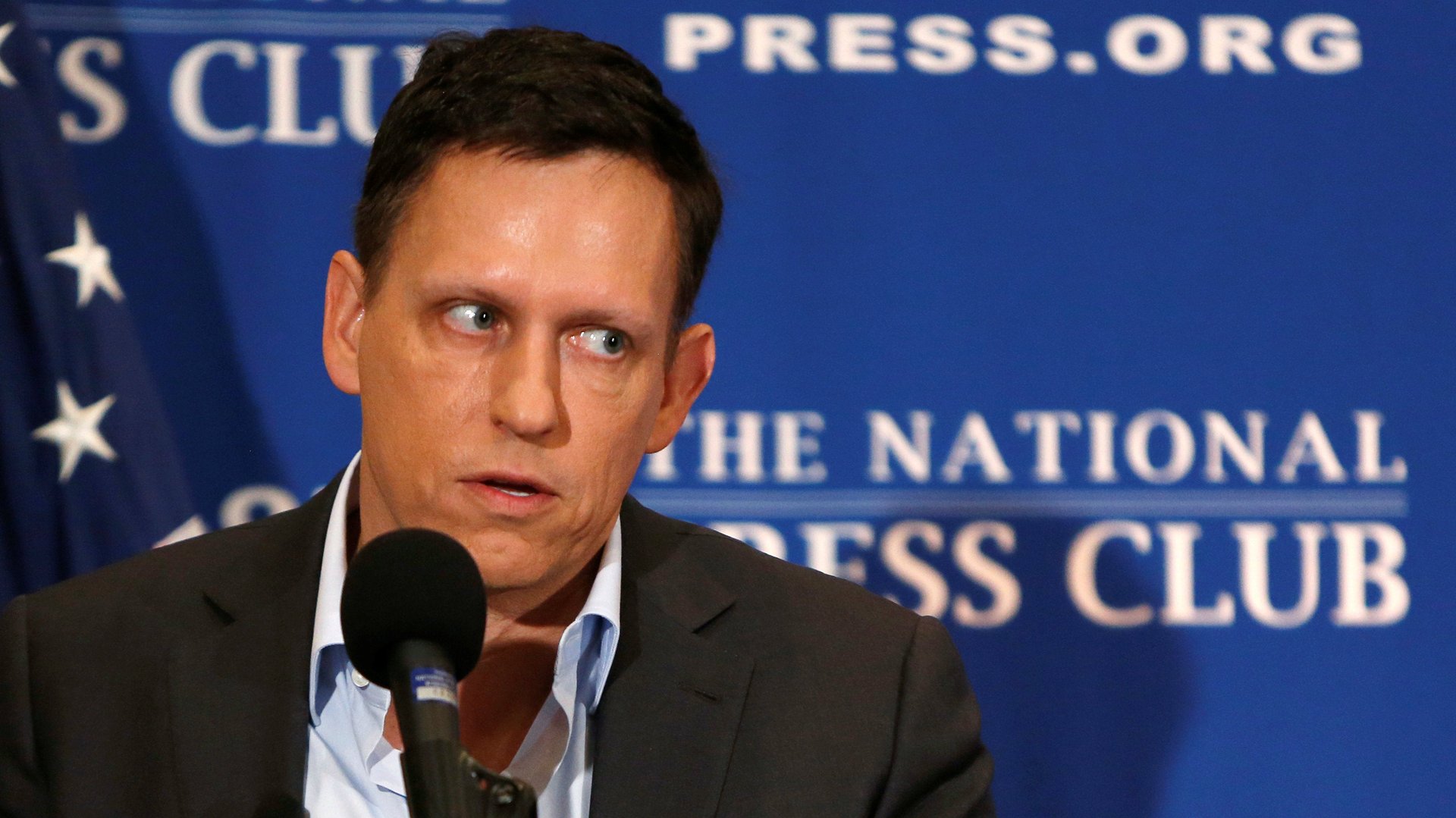Bitcoin is the “new world currency” Peter Thiel wanted PayPal to be
Bitcoin prices rose on a Wall Street Journal report (paywall) that Peter Thiel’s investment fund recently made a major wager on the cryptoasset, adding to the list of bigwigs whose support for the market has inflamed the mania. But the PayPal co-founder is no bitcoin arriviste—he’s had a vision for a stateless digital currency for nearly two decades.


Bitcoin prices rose on a Wall Street Journal report (paywall) that Peter Thiel’s investment fund recently made a major wager on the cryptoasset, adding to the list of bigwigs whose support for the market has inflamed the mania. But the PayPal co-founder is no bitcoin arriviste—he’s had a vision for a stateless digital currency for nearly two decades.
Founders Fund, the venture-capital firm co-founded by Thiel, bought $15 to $20 million worth of bitcoin last year, the Journal said yesterday, citing unidentified sources. Those holdings are now reportedly worth hundreds of millions, as bitcoin’s price climbed 14-fold in 2017. Bitcoin rose as much as 13% to $15,392 on the CoinDesk price index in the 24 hours since news of the Founders Fund holdings broke.
When Thiel started PayPal, he never saw it as simply a payment mechanism for eBay sales, or a way for millennials to split bar tabs. In a Reddit “Ask Me Anything” session in 2014, Thiel talked about his failure to deliver on his original ambition to turn PayPal into a “new world currency.” (The company’s website now says it’s “committed to democratizing financial services.”)
What exactly would Thiel’s “new world currency” achieve? Here he is at a company meeting in late 1999, according to Eric M. Jackson, an early PayPal marketing executive and the author of a book on the company:
“PayPal will give citizens worldwide more direct control over their currencies than they ever had before. It will be nearly impossible for corrupt governments to steal wealth from their people through their old means because if they try the people will switch to dollars or pounds or yen, in effect dumping the worthless local currency for something more secure.”
PayPal was founded in 1998 by Thiel, an avid libertarian, and others. He wanted to use cryptography to send money online, according to Nathaniel Popper’s 2015 book Digital Gold. But the company ran into roadblocks over concerns that it could help foster illegal activities like money laundering. As restrictions mounted, PayPal scaled back its ambitions and Thiel eventually left the firm. Digital currency was seen as an “unfulfilled dream of Silicon Valley,” Popper writes.
Does that ambition sound a little like a “peer-to-peer electronic cash system” that bypasses centralized authorities like banks and mints? That’s what the pseudonymous Satoshi Nakamoto described in his Oct. 2008 paper (pdf) setting out the mechanics of bitcoin.
Bitcoin has benefited from the interest of high-profile institutional backers. Though Wall Street’s involvement remains minuscule, news of interest in the burgeoning market has added fuel to the crypto boom. Major global exchanges in Chicago have developed derivatives that could help institutional traders and investors participate in the mania. One of those firms could be Goldman Sachs, which is setting up a trading desk for cryptoassets, according to Bloomberg. Bloomberg itself recently added price data for ethereum, litecoin, and ripple to its terminal network that’s used by professional traders. Donald Wilson (paywall), founder of high-speed trading firm DRW, set up a crypto unit in 2014.
News of such endorsements is the closest thing to “fundamental” information that could assign a value to these digital coins. Stocks, for example, are issued by companies whose earnings can help the equity’s worth; fiat currencies’ value often depends on the interest rate that the government pays on its debt. For now, the value of a bitcoin mainly depends on the faith that more people, like Thiel, will embrace it.
Correction: a previous version of this story referred to Goldman Sachs as a future bitcoin investor. It is reportedly setting up a trading desk to make markets.